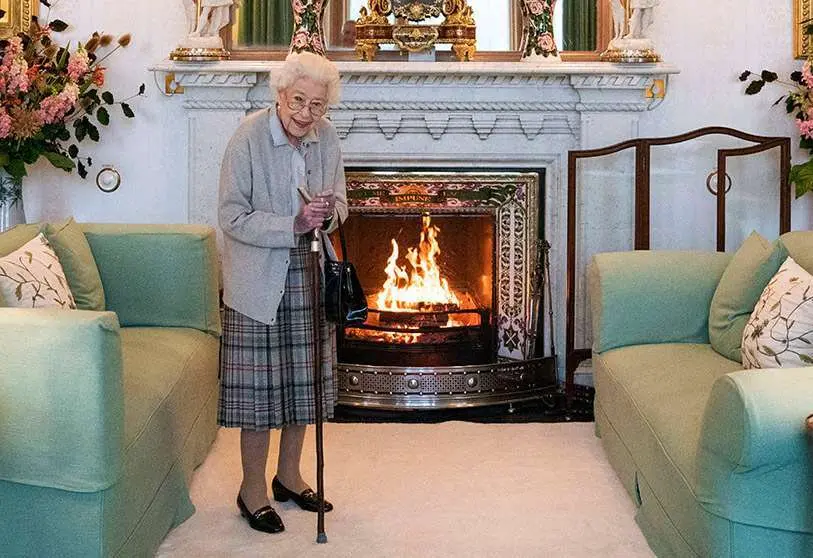Elizabeth II: A great professional between Empire and Brexit

The longest reigning queen in British and world history has died, and the newspapers will fill pages and pages with all the details from her birth to her funeral, plus all the gossip that has swirled around her family over the last half-century. Elizabeth II was a woman with largely symbolic powers which she performed masterfully, even though she was not expected to reign when she was born, being only third in line to the throne, and has presided over the life of the United Kingdom for the last 70 years, during which time she has earned the respect of her fellow citizens and the admiration of foreigners.
There are four dimensions to consider in her long life (96 years) which has almost reached a century, so much so that when she died there were only 150,000 Britons who were older than her out of a total of 67 million, meaning that the vast majority have never known another head of state in their lives. It will surprise them to have to say now that God save the King.
The first dimension is political. Elizabeth II has presided over Britain's decline, ascended the throne in 1953 when her country had the greatest empire in the world and died when the UK is alone and made up of one island and a piece of another in the middle of the Atlantic, with no empire to put in its mouth and in the midst of a deep crisis that is both political and economic (with inflation that could reach up to 15%) and exacerbated by Brexit (which the Queen is said to have supported), Scotland's claim to an independence referendum (which the Queen is said to have disliked), and disagreements with Europe, especially over Northern Ireland, which Lizz Truss (once a Republican) may exacerbate by seeking to go back on what she signed with Brussels, at the risk of reopening the Good Friday Agreements that put an end to the bloodiest years of her reign.
On a political level, the Queen, who has had fifteen prime ministers, has met seven popes and countless heads of state in other countries around her, and with all of them she has shown discretion and good behaviour. Her influence has been based on her silence, her example, her dignity, her discretion, her exquisite neutrality, her sense of state, which is lacking in so many politicians, and which she has placed above all else. Her personal conduct has always been impeccable, as a monarch's should be, far removed from any personal scandal.
In short, she was a great professional who made her sense of duty her life's guiding principle and who demanded that those around her did the same. That is why she prevented her sister from marrying the love of her life. As a woman, she married in love and had to put up with grumpiness and other things from a husband with a sour sense of humour and never quite satisfied with the secondary role granted to her by protocol. Elizabeth II gave the image of a cold woman, reminiscent of that phrase attributed to Lord Byron that "the more I know men, the more I love my dog", because where she was really - never better said - at ease was at Balmoral with her dogs, her horses and her hunting. That is what she really liked. The coolness with which she dealt with Princess Diana's death, however unkindly, caused astonishment among her subjects. He did not understand what it meant to be "the people's princess" because the idea was totally alien to his distant concept of the monarchy, shrouded in an old-fashioned pomp that the British care for (and exploit) like no other. But she was able to rectify this when Tony Blair put her in front of the mirror in what she herself confessed was her annus horribilis. And she overcame it to the point of leaving the institution with a high degree of popularity at her death, which it is not certain that her son will be able to maintain.
In her dimension as a mother, the first thing to understand is that the relationship with children in the UK is different than in Spain, it is more distant and even more so among the upper classes of what is undoubtedly the most classist society in the West, and I dare not say in the world because there is India, where categories have legal status. Nowhere more than in the UK does it occur to an MP to insult a policeman by calling him a "commoner". And his children and grandchildren have given him many problems, some of them very recent, over the seventy years of his reign, gossip that has filled tabloid pages halfway around the world. He has tried to help them, but always putting his duties as monarch first, respecting tradition, but also introducing some touches of prudent modernity, as when he authorised the marriage of the current king to a divorced woman.
And this brings us to the fourth dimension of the monarch in the United Kingdom, which is not without its peculiarities, since Charles III, a divorced man, is head of the Anglican Church, which does not accept divorce when it was created with a king, Henry VIII, who wanted to divorce Catherine of Aragon. What they call it is a bit of a stretch. This dual political and religious legitimacy is shared by the British monarch with the King of Morocco, the King of Saudi Arabia and some Southeast Asian monarchs such as Thailand and Bhutan, with the enormous difference that in the United Kingdom the king presides over a long-established democracy that shows those who yearn for the republic that monarchies can be as democratic as they are. Or rather more so.
May he rest in peace. May his example live on.
Jorge Dezcallar is Ambassador of Spain.

